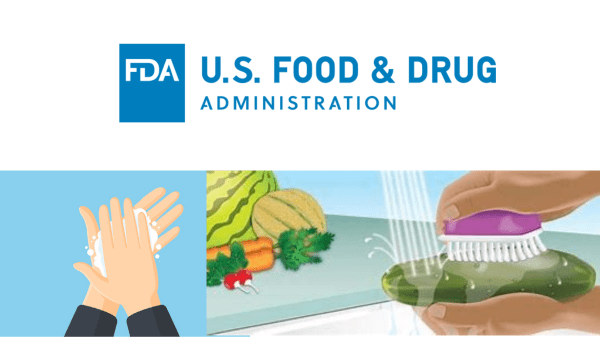
Another step has been taken in the steep uphill climb to getting the federal Food and Drug Administration (FDA) to deal with food safety in the United States in any but the most perfunctory way.
On October 26, an FDA Foods Coalition was launched to advocate for a more effective foods program at the FDA, with an aim to preventing foodborne illness outbreaks and other food safety risks.
Made up of consumer advocates, food industry representatives, public health groups, and state and local regulators, the coalition will educate policymakers, media, and the public about improving the governance of the FDA Human Foods Program.
Members of the coalition include the International Fresh Produce Association (IFPA) BB #:378962 and Western Growers (WG) BB #:144734. Other participants:
- Consumer Reports;
- International Dairy Foods Association;
- the American Frozen Food Institute;
- Association of Food and Drug Officials;
- Center for Science in the Public Interest;
- Consumer Brands Association;
- Consumer Federation of America;
- Environmental Defense Fund;
- Environmental Working Group;
- Peanut and Tree Nut Processors Association; and
- STOP Foodborne Illness.
The rather ineptly named Human Foods Program was created by FDA commissioner Robert Califf in the wake of the agency’s disastrous response to the Abbott Labs neglect of safety in infant formula manufacture during the winter of 2021-22. The program has essentially unified the agency’s food safety regulation under a deputy commissioner, now James “Jim” Jones.
The FDA Foods Coalition will ostensibly work with the agency to ensure that the Human Foods Program will communicate and promote “a clear, compelling vision”; develop and nurture a culture where “regulatory decision-making is focused on consumer safety and public health, rooted in scientific evidence and FDA’s legal framework, and occurs in a timely and predictable way”; establish stronger relationships with state, local, and tribal governments; and prioritize “meaningful stakeholder engagement and collaboration in regulatory priority setting and decision making based on science-driven and effective risk management principles, maximum transparency and data sharing.”
Whether this objective will accomplish anything meaningful remains to be seen. Califf requested a total budget of $7.2 billion for 2024.
Of this, the total budget request for all foods programs is $1.361 billion—slightly less than 19 percent of the agency’s total request. Which, to my mind, reflects a limited interest in food safety.
Oh, by the way, the Republican-controlled House of Representatives has proposed deep cuts to budgets for both USDA and the FDA.
Although the House will have to work out an agreement with both the Senate and the White House, conceivably FDA will have even less than its rather minimal request for food safety.
It’s a good thing there’s a coalition. Food safety needs to have somebody on its side.
Another step has been taken in the steep uphill climb to getting the federal Food and Drug Administration (FDA) to deal with food safety in the United States in any but the most perfunctory way.
On October 26, an FDA Foods Coalition was launched to advocate for a more effective foods program at the FDA, with an aim to preventing foodborne illness outbreaks and other food safety risks.
Made up of consumer advocates, food industry representatives, public health groups, and state and local regulators, the coalition will educate policymakers, media, and the public about improving the governance of the FDA Human Foods Program.
Members of the coalition include the International Fresh Produce Association (IFPA) BB #:378962 and Western Growers (WG) BB #:144734. Other participants:
- Consumer Reports;
- International Dairy Foods Association;
- the American Frozen Food Institute;
- Association of Food and Drug Officials;
- Center for Science in the Public Interest;
- Consumer Brands Association;
- Consumer Federation of America;
- Environmental Defense Fund;
- Environmental Working Group;
- Peanut and Tree Nut Processors Association; and
- STOP Foodborne Illness.
The rather ineptly named Human Foods Program was created by FDA commissioner Robert Califf in the wake of the agency’s disastrous response to the Abbott Labs neglect of safety in infant formula manufacture during the winter of 2021-22. The program has essentially unified the agency’s food safety regulation under a deputy commissioner, now James “Jim” Jones.
The FDA Foods Coalition will ostensibly work with the agency to ensure that the Human Foods Program will communicate and promote “a clear, compelling vision”; develop and nurture a culture where “regulatory decision-making is focused on consumer safety and public health, rooted in scientific evidence and FDA’s legal framework, and occurs in a timely and predictable way”; establish stronger relationships with state, local, and tribal governments; and prioritize “meaningful stakeholder engagement and collaboration in regulatory priority setting and decision making based on science-driven and effective risk management principles, maximum transparency and data sharing.”
Whether this objective will accomplish anything meaningful remains to be seen. Califf requested a total budget of $7.2 billion for 2024.
Of this, the total budget request for all foods programs is $1.361 billion—slightly less than 19 percent of the agency’s total request. Which, to my mind, reflects a limited interest in food safety.
Oh, by the way, the Republican-controlled House of Representatives has proposed deep cuts to budgets for both USDA and the FDA.
Although the House will have to work out an agreement with both the Senate and the White House, conceivably FDA will have even less than its rather minimal request for food safety.
It’s a good thing there’s a coalition. Food safety needs to have somebody on its side.
Richard Smoley, contributing editor for Blue Book Services, Inc., has more than 40 years of experience in magazine writing and editing, and is the former managing editor of California Farmer magazine. A graduate of Harvard and Oxford universities, he has published 13 books. The latest is Seven Games of Life and How to Play.




